I was in such a hurry to get to the Micronesian island of Kosrae, such a hurry to see its isolated beauty, such a hurry to begin my first year of teaching—in such a hurry to be out of my old life and in this new. After arriving, I wanted to jump right in, get my new house settled, fill it with food, set up the computer, arrange my classes and office, drive the length and breadth of the landscape and snorkel my fool head off in the island’s gleaming aquamarine waters. But as I was soon to learn, being in a hurry to do anything on a tiny tropical island is only begging for disappointment.
Since the arrival of missionaries in the 19th century, Kosrae has seen but a small stream of visitors to its verdant volcanic hump out in the far Pacific—its remoteness has kept it at some remove from broad development. There’s not much else out there for miles and miles, except for a few other small islands and many fish the color of electronic dreamscapes. Most goods arrive by the proverbial slow boat, and its air traffic is languid and modest. I’d signed a contract to teach a full course load of English classes at the small community college, where all the students spoke and read English, with varying degrees of skill. But the barriers for me there would prove to be more temperamental than linguistic.
A Different Kind of Slow Food Movement
First there was the matter of eating, which is fairly fundamental to any progress anywhere. But my girlfriend and I couldn’t quite figure out how it was done on Kosrae. The island is about eight hours in the island-hopper air from Hawaii, but it’s not from the air that the food arrives. No manna here, just goods that arrive on a big ’ol boat, once every six weeks. That is, if the boat’s not tied up in customs on some other island, or has broken down somewhere, or the captain missed a turn, maybe because he was blinded by miles of empty ocean. Thus, in our year on the island, six weeks more than once became a couple of months.
Shopping on a tiny island is a fascinating experience. There were only a few of what Westerners would consider grocery stores, and most of those were little shops with only a few aisles of goods. Thus it would be remarkable to go into the store and see an entire half-aisle devoted to Spam. One would never know that Spam came in so many flavors: Onion, Garlic, Spam with Cheese, Hot and Spicy—I would have bought some for sure if it came in Cheerios flavor.
We weren’t aware at first that there were small “cottage goods” stores everywhere, many in ramshackle buildings. They had a limited number of almost random-seeming goods: lettuce, salt, motor oil, batteries, cups. Residents went to one market for canned soup, another for lobster, another for candy bars, passing through ragged towns and scattered shack/stores and the few “regular” commercial enterprises, like Ace hardware. The many roadside stores usually didn’t have parking lots, so cars piled haphazardly about.
So, if you tried to put dinner together, you might go to ALL of the island’s stores, trying to find mayonnaise here, canned beans there. Before we learned the process, a dinner’s ingredients could take hours to obtain. There were also a number of tiny roadside stands that sold goods from the family farms on the island, so you could pick up excellent tangerines at one, and perhaps Napa cabbage at another. But they were open at very whimsical times, and if one of the other Westerners heard that there was something at a stand or a store—”cheese at Tafunsak!”—the rumor could sweep the island. And then your supposed friends could wipe out the entire supply before you arrived. Of course, you could always wait for the next boat.
Western Appetites and Habits Don’t Apply
We had to pay closer attention to the natural offerings of the island, instead of applying our Western appetites and habits, which usually involved quick meal preparation and quick meal consumption. It took a bit for us to zero in. But we came to see that Kosrae was incredibly lush: There are coconut palms, five types, everywhere, with broken coconuts strewn about. Banana, taro, papaya, breadfruit and pineapples growing everywhere—no need to go hungry. The crab, fish and lobster are plentiful, and remarkably cheap. We learned the times to go to the harbor and avail ourselves of that bounty, as well as where and when the individual fishermen returned from their outings.
There was a period where the boat was more than six weeks’ late, and the island was short on flour and rice, maybe the equivalent to being short of wheels on your car in the U.S. But by that point, we understood. We learned how to make do (and make do well) with what we had—and how to wait for what was coming.
Seek Shade, Slowly
The climate was another matter that we adjusted to only gradually. Sure, we’d been warned about the heat and humidity. I’d been in Mississippi in August—I know from heat and humidity. What I didn’t expect was the very weight of the heat and humidity, which settled on us like a steamy film the second we got out of the plane. When we first landed on the island there was a tropical downpour, and it was like a movie set: the body-bouncing roar of the wind and the inconceivable amount of water that was sheeting down from the sky; I realized then that “deluge” was more than a word.
And let’s get that temperature thing over with right off the bat: on a tropical isle: you sweat. You will sweat there no matter if you are sitting quietly in a chair, slowly walking, or—are you crazy?—riding a bike or running. It took a while for us to really gauge it, but the natives, from kids to elderly (though the elderly seem limited in number) all moved very slowly—it’s practical. It was weird to see some of the island’s few white people running (!) for exercise in the incredible humidity.
More surprising yet was performing some seemingly aerobic-neutral action, for instance, washing the dishes, and finding yourself coated anew. But you must move, damply, with the local motion: I soon shifted from changing my shirt three times a day to the soggy recognition that I simply got dirtier there, so I let my brow-moppings show through.
I established new standards—I mingled in public wearing shirts whose shoulders and hems betrayed serious brow-mopping stains, something my pre-tropics life would never have sanctioned. And it’s not just people that sweat: things here get covered—quickly—in a kind of damp saltwater sheen. Leave your glasses on the table for an hour and put them on again and the world is a fuzzy, damp sight to (sort of) see.
But there were some advantages: I learned—stumblingly—to move more slowly, as is the Kosraean way. We finally got clued in that almost all circumstances were approached at a measured pace by Kosraeans: they walk slowly, talk slowly and eat slowly.
And even though it seemed you spent half your day drinking water, you didn’t spend the other half in the bathroom, because you plumbed through your skin. Also, my joints felt good and loose there. Slow had some flow.
Even the World Wide Web Has Edges
I had some big ideas when I arrived on Kosrae that I’d be able to continue querying and submitting magazine pieces, and also doing some business copywriting in addition to my teaching duties. We had done some research on the island’s communication capabilities, so we knew that there was connectivity there, even if it was through dial-up modems.
But I wasn’t quite prepared for the adjustment of going from modestly fast broadband in the US to 28K on a temperamental island connection. Trying to transfer 1MB files was agonizing, particularly when the line would drop and you’d have to begin anew. I railed about the connection, its maddening inconsistency, and its inefficiency.
But to what end? It never got any faster or more reliable. Instead, I moved toward acceptance. It was amazing that I could send and receive email at all, thousands of miles away from home, out on a tiny island in the blue, blue Pacific. There were never any big consequences from an email being delayed, or a file not getting somewhere until the next day.
If it took 10 minutes for a web page to load, I’d read at my desk. If a file might take an hour to send, I’d go for a walk. After a while, I found the whole communications situation humorous (though I never could quite find any pleasing melody in the ear-splitting squawk of that modem).
Going Nowhere Is More Fun When Going Slowly
Maybe having been raised in Los Angeles County was the source of my initial impatience with island driving. Driving on the island’s main road to anywhere was always interesting: most drivers didn’t seem to want to tax the engines of their right-hand drive cars (mostly imported from Japan), and thus they cruised along at 15–20 mph, where 50 might do for an American driver. And pulling over in the middle of the road to talk to a pedestrian seemed to be a part of many drives—people ambled across the roads at all times, and cars would often stop in the middle of the road for conversations with passersby.
For the first month or two after we’d gotten a car, I used to try to whip around motoring laggards—after all, I had places to go. I’d never do that in any kind of a road-rage fashion, but I’d safely pass the slow cruisers and get on with it.
But in time, I learned to slow down. Lots of very small children often walked on the side of the narrow main road, and I was terrified of hitting someone. And I began to appreciate what driving slowly on a tropical island was all about: you’d swing around a wide curve, and see a remarkable, shimmering cove, or a new view of the island’s brilliantly green low mountains. We’d spot some island feature or building or person we hadn’t seen before. Slow going became good going.
At Least It Wasn’t Carrier Pigeon
The mail situation too turned from one of frustration to humor. Mail from the US was completely unpredictable: a package might arrive in a week, or in two months. We got a deluge of Christmas catalogs in April. An island friend of ours had set up a schedule with her mother in the US to send her a package once a month for six months, and all the packages were mailed on time in the US, but arrived on the island all at once, a bit after six months were up.
But as with the shopping, the climate, the driving, the emailing—the slow mail taught us to slow down. Again, we learned how not to react with annoyance at delays—island life wasn’t the life we’d had in the States, but it was fascinating. We slowed down, and for the most part, found it agreeable.
The Teacher Got an Education
But the most difficult adjustment, and one that ended up requiring a patience that was slow in coming for me was my teaching job. My teaching experience on Kosrae was probably the strangest job I’ve ever had, and a deep challenge. Before I began, I got a warning from a teacher who had been there more than 10 years: “I hope you’re not too sensitive. You might go the entire year without hearing some students speak. You’ll ask students questions and they will simply look at you, as though they don’t understand. Most of the classroom experience will be just you, talking.”
OK, I got it—Kosraeans are shy and won’t talk too much in the classroom. I could probably handle that. But a circumstance in theory is different in practice, and for a novice teacher like me, that difference was by turns puzzling, maddening and disheartening. It wasn’t simply that students would not respond to my lectures—most students would not respond, not even a word, to direct address, even if I questioned them from two feet away. At times I felt like a stalker: most of my victims would simply turn from me, looking away impassively.
It seemed that requesting vebalization in class rubbed on the wrong side of the prevailing mores that island youth don’t speak freely to adults (and perhaps to white, male foreign adults in particular), and they also aren’t comfortable standing out in a group.
I thought at first that they would adjust to me, and loosen up as the semester progressed. Wishful thinking: I taught a full year, with many students enrolled in several of my courses both semesters, and the silent lockup of my classrooms never relented. For more than a handful of my students, I indeed never heard them speak a word in English.
Surely, you’d think, I’m some kind of curmudgeon, perhaps a dry, imperious sort who projects an intimidating air, choking student ease and creativity. No, I’m a person who delights in learning, in discussing literary idea and style, in seeing the creative spark hit its mark. Try as I might to convey my enthusiasm for the written word, how to craft it, how to interpret it, my classes too often held the dead air of my voice, and my voice alone.
Moving from Frustration to Fortitude
Having been on the receiving end of years of classroom writing instruction, I figured I could poach any number of exercises, prompts and writerly bonhomie from my mentors to draw out my silent charges. But I came to see that a shift in culture couldn’t be compelled with a quick click. Because my Kosraean students were exceedingly unforthcoming in class verbally, I came more and more to rely on their written efforts—not merely to gauge their academic progress, but to catch a glimpse of the Micronesian mind.
For all their vocal withholding, my students were remarkably expressive in their essays, which often explored some of the nuances of island life and culture that I didn’t easily discern. I was quick to encourage the free range of their imaginations in their writing, and came to know many of the students on an individual basis, some for their humor, some for their anxieties, some for their creative turns of phrase, which if often ungrammatical, still captured the wonder of words at work.
And perhaps there was something about me that intimidated my students, try as I might to be open and engaged. My girlfriend Alice taught at the high school, and though she regularly witnessed the tendency toward silence many students conveyed, she had a number of students who were talkative and at ease in her classes. Perhaps it’s because they were younger than my students. Or perhaps it was my scraggly beard, who knows?
I continued to find some frustration at my inability to coax conversation from the students, but I did finally see some loosening up around me, and saw the pride in many faces when I praised some of the particulars of their written work. Interestingly enough, when I saw some students outside of the classroom—it was a very small island, after all—they seemed much more free with greeting me and exchanging a few sentences. I should have remembered that when I was young, I too often looked at a classroom as a prison of sorts.
The World Is Wide (and Beautiful)
I never felt any sense of imprisonment in those waters. The marvel of the Pacific Ocean right out our door was so alluring: Alice and I snorkeled almost every day—the other-worldliness of Kosrae waters was hallucinatory. We’d take a turn around a coral corner, and small schools of incandescently colored darting miracles would streak by in collected lines and columns or float by in tranquil suspension. Comically colored parrotfish, huge wrasse, eels, rays, turtles, bulging groupers, reef sharks and so many more. Corals like ottomans, purple and green and blue. Ten-foot coral towers with knobs and knurls, and squat barrels of crenulated purples and greens. Brain corals with viscous mantles. All in waters so warm that you almost wonder if there’s something wrong when you first step in. The ocean wonders made up for the occasional house spiders the size of poor-boy sandwiches.
Shy though they could be (and I often felt shy in return), the Kosraeans are also friendly people, inviting us to many cultural feasts and event days, where it seemed like half the island would turn up for things like canoe races, speeches and giant meals wrapped in palm fronds. We did get to know a number of the people fairly well, and always felt welcome in their company. One young woman whom Alice taught became quite close, and to this day refers to herself as our daughter. I kept many of the students’ essays, and still read them on occasion, marveling at the differences and similarities of a world so far away.
Ten years have passed since our year on that island, and it sometimes feels like a dream. Our year there was baffling, hilarious, depressing, heartening, peculiar, and engrossing—and very, very humid. I despaired of the cereal that had expiration dates from years past; I exulted in the yellowfin tuna that tasted of heaven’s clouds. I cajoled, pleaded, made stern admonitions, danced, laughed and tried a thousand tortuous ways to engage my students, but mostly they just stared at me. I saw undersea worlds that were shockingly, arrestingly beautiful. I saw poor people living in hard conditions, but making their way with smiles and effort.
I remember a lot of the little things: the kindergarten class of expatriates and Kosraean kids singing old hymns in class; picking fragrant plumeria blossoms to make a lei from laden trees, the snow-white frigate birds swinging through the coconut palms as we sat in the front yard in the early morning thick air.
I know I’ll go back, and this time, I’ll go slowly.
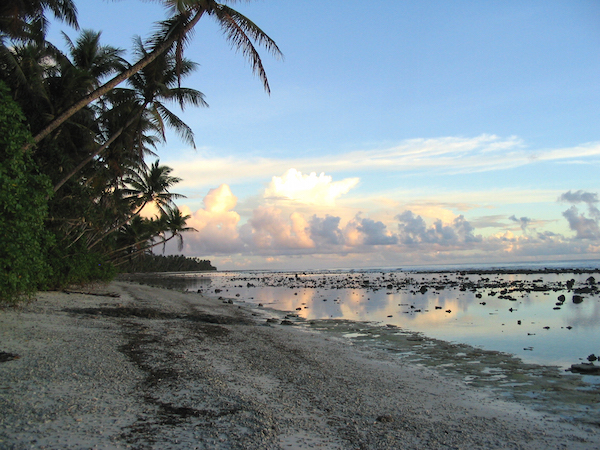
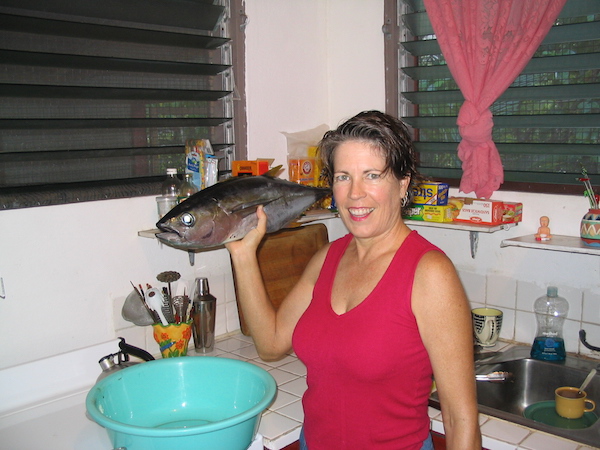
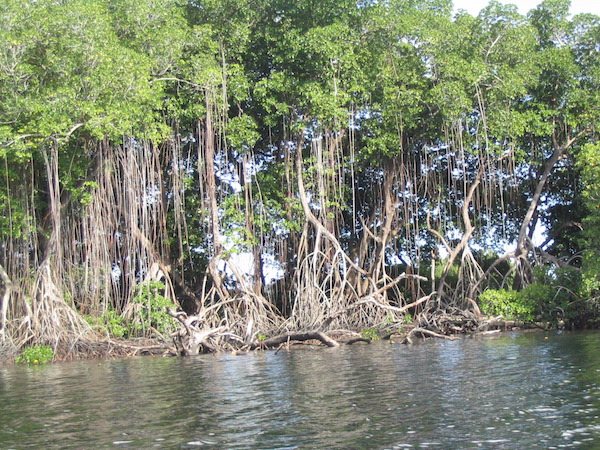
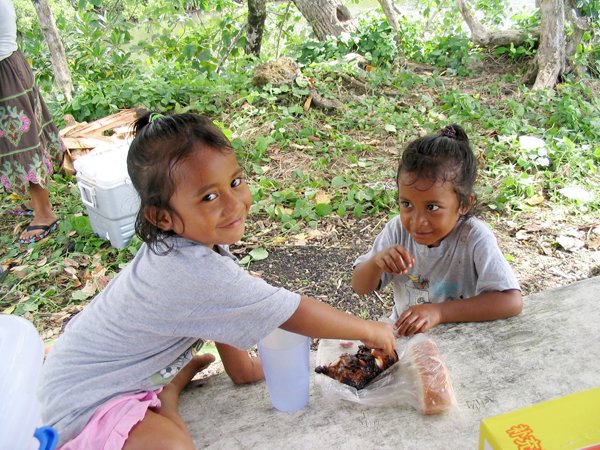
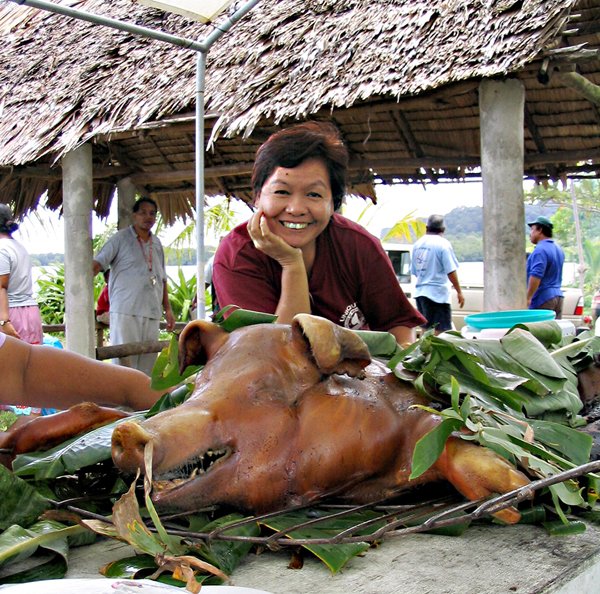
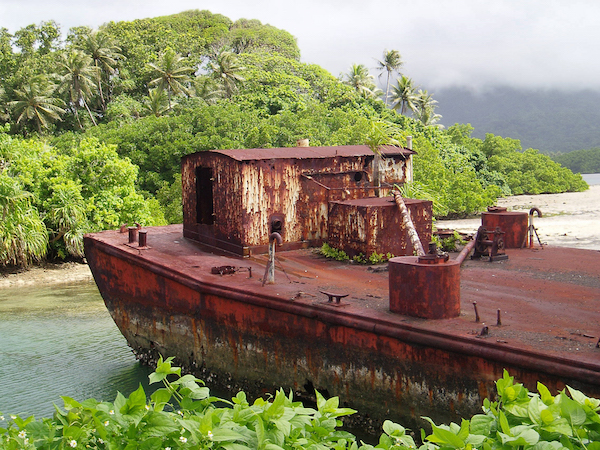
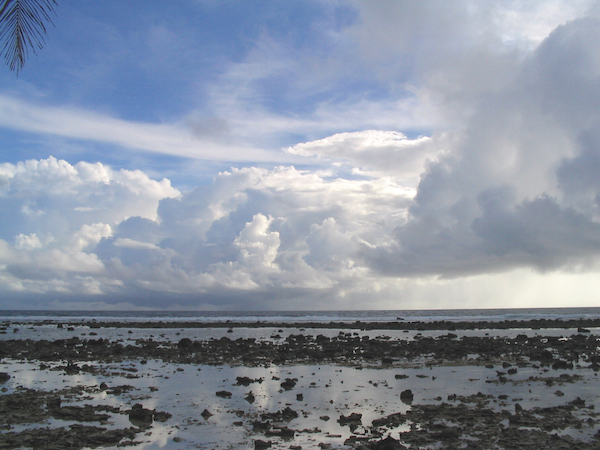
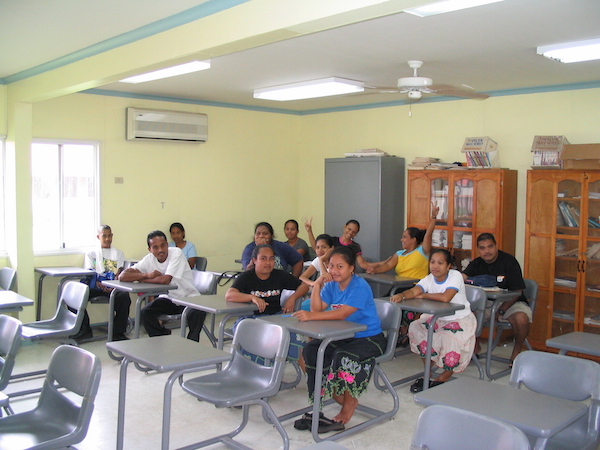
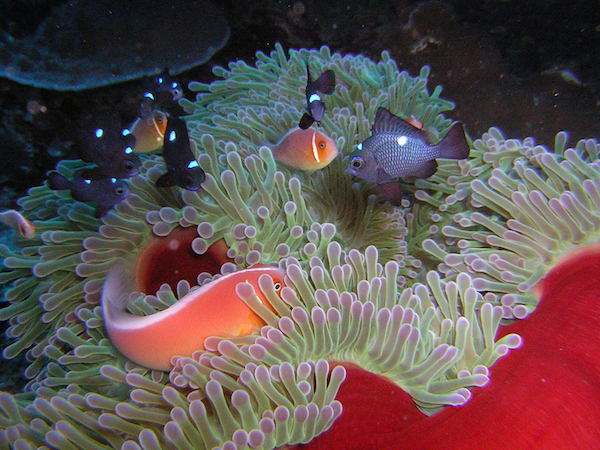
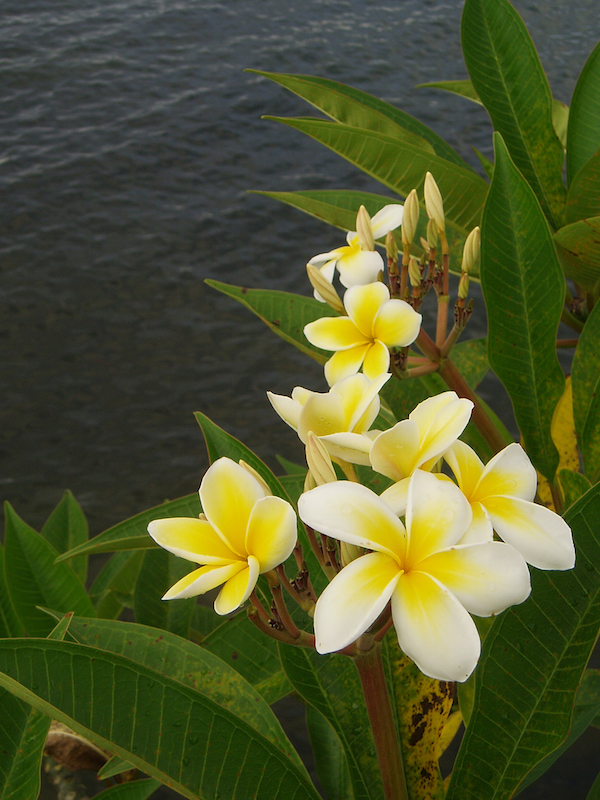

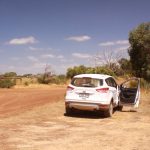

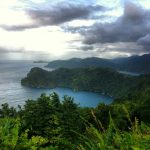
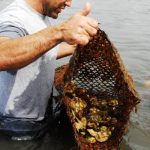
What a place!!!!
Yes, Kosrae has been on my list since my first trip to Micronesia, it seems so isolated.
Andrea, yes, it’s a remarkable place, and at that time, 10 years ago, it seemed particularly isolated—though there are many Pacific islands that are more so. I do want to get back and see what 10 years have done.
Dave, let me know when you’re going and I’ll make sure that a hot plate of roast dog is waiting.
I love those photos of the kids and the woman with the roast pig. Honestly, I don’t think I have it in me to stay a whole year some place that isolated. I can imagine it seems like a dream. Must be a great place to get to know yourself though. If one is not the introspective type it might be dangerous.
I’ll pass on the roast pig and have the lobster with fresh coconut water and mango rice for desert please.
Wow! Now this is a travel piece. I love the range of topics covered, from teaching to cooking to transportation and more. Also, the author’s has a fantastic sense of self-deprecating humor. Feel ten years younger after reading this! 🙂